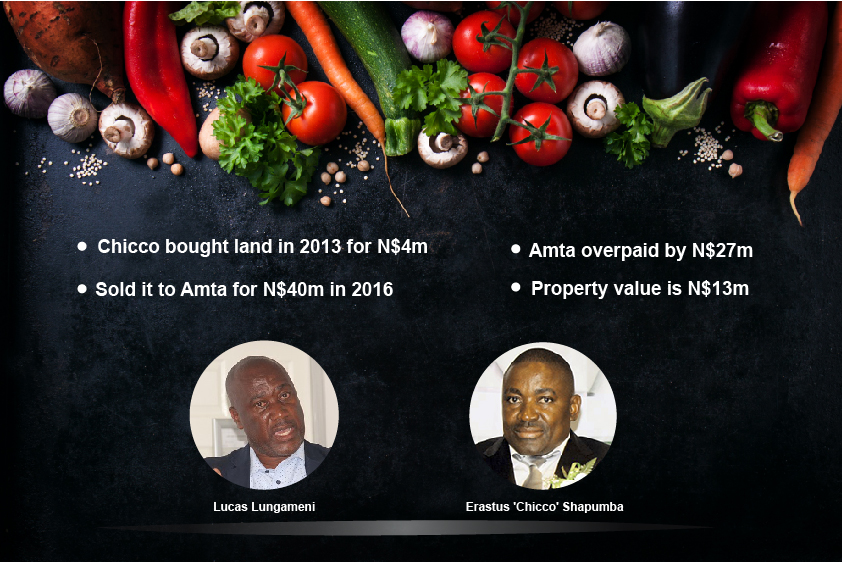By Shinovene Immanuel | 19 September 2017
FINANCIALLY struggling state-owned Agro-Marketing and Trade Agency (Amta) bought a property in Windhoek for N$40 million, thereby overpaying by as much as N$27 million, documents show.
The government formed Amta in 2015 as an agency responsible for the marketing and selling of agricultural products on behalf of the state.
Amta operates fresh produce hubs in Windhoek and at Ongwediva and Rundu, and has mostly been used as a cash-cow by business people such as Erastus ‘Chicco’ Shapumba, who has secured several deals with the agency.
The Namibian reported last month that Amta had been paying over N$140 000 per month to Shapumba since 2015 for renting an unused property at Oshikango.
The total amount spent on the unused property so far, according to calculations by The Namibian, is over N$2,7 million from December 2015 to July 2017.
Now, new documents show that the Oshikango land is not the only property deal that has seen Shapumba laughing all the way to the bank at the expense of taxpayers.
Amta said in their 2016 annual report that they bought a property measuring around 3 000 square metres in Windhoek’s northern industrial area for around N$40 million.
What the parastatal did not say is that they paid Shapumba N$27 million more than the value of the property.
Shapumba bought the land from Trustco in 2013 for N$4 million, according to deeds documents.
The businessman then sold it to Amta for around N$40 million in 2016, making a clean N$27 million in the space of three years.
The property is situated in Industria Street, and was owned by Shapumba’s company called Erf Two Zero Nine CC.
Amta, represented by its general manager, Lucas Lungameni, first entered a lease agreement in 2015 with Erf Two Zero Nine CC with an option to buy the property.
According to the lease agreement which existed before the sale, the agency was expected to pay N$190 000 per month for five years from 1 March 2015, and also pay a deposit of N$190 000 by 1 February 2015.
The agreement also made Amta responsible for the payment of electricity, water charges, rubbish removal, and cleaning of the premises, while Shapumba would pay for rates and taxes.
However, even the auditors questioned why the new parastatal which relied on government bailouts was overpaying for land.
Auditors BDO Namibia wrote to Amta’s management on 31 March 2016, saying the parastatal was given a raw deal, especially considering that the state-owned entity received valuations from three companies which were below the price they paid for the land.
The valuers contracted by Amta include SBN Property Investment CC, who valued the plot at N$13 million, while a second company, Property Valuations Namibia, said the property was worth around N$23 million.
The third company, Valuation Services Namibia, valued the property at N$27 million.
It is not clear why there is a massive difference between the valuations, but the auditors questioned why the parastatal opted to overpay.
“The purchase price accepted by the agency is more than all three valuations. It is not clear why a significant premium was accepted.
“The seller would not have been able to sell the property at a significant premium on the market,” BDO Namibia said in its report, adding that it was a financial loss to the company.
The letter also read that since the agency was set up to fulfil certain of the agriculture ministry’s mandates, written approval should have been obtained from the ministry for the purchase of any asset, unless the spending had already been approved and funding set aside for such purchase.
“This was not in the ministry of agriculture’s approved budget for the capital expenditure. As such, the agency might not be able to fulfil its obligation as management is likely to divert operational funding for this purpose,” BDO said.
According to a person familiar with this transaction, Amta did not only buy the property at an inflated price, but the valuations were done after the parastatal had developed the area at its own cost.
The source added that Amta’s financial contribution towards the developments was not deducted from the valuations.
Amta’s spokesperson, Meke Namindo, told The Namibian yesterday that the company would pay around N$40 million in monthly instalments for five years.
Namindo added that the agency received property valuations for February 2016 and for March 2019, and that they decided to pay the projected 2019 value.
According to Amta, Valuation Services Namibia said the market value of the property would be N$39 360 000 in 2019, while Property Valuation Namibia said the property would be worth N$30 million in the same year.
SBN Property Investment CC said the property would be valued at N$25 750 000 in 2019.
The explanation by Amta to pay the 2019 value was heartily laughed off by a property valuer who spoke to The Namibian yesterday.
The expert declined to be named, but is one of the best in the industry.
The expert said although a property owner can choose to sell their assets at a future price, it does not make much sense for a company to buy at that value.
“You can do that as a property owner. If you do not want to sell a flat, for example, and the buyer is persistent, then you can look at what you would have made for rent in the next two years or so, and add that,” said the valuer.
“I would not purchase a property based on a future evaluation, no,” the valuer stressed.
Efforts to get comment from Shapumba were not successful as his phone went unanswered.
However, lawyer Sisa Namandje is one of the key figures involved in ticking off most of Shapumba’s questionable deals.
Namandje confirmed that he negotiated the terms of the sale on behalf of Shapumba for the property.
He added that the relationship started with a lease agreement with an option to buy, and Amta decided to purchase the property because it was ideal, and there were other parties interested in the property.
* This article was modified






